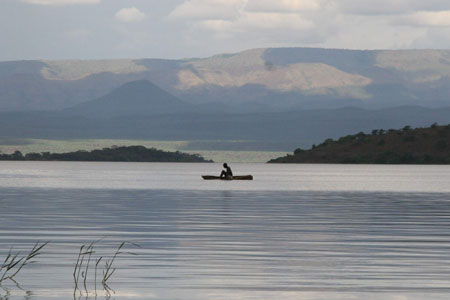TCD Students Participate in Kenyan Field Course
Posted on: 10 June 2008
The Trinity MSc Biodiversity and Conservation class of 2007-8, together with lecturers Dr. Ian Donohue and Professor David Taylor, recently returned from a field course to Kenya. The course, which is a compulsory part of the School of Natural Sciences’s new MSc Biodiversity and Conservation programme, took place in and around the Great Rift Valley, and was run jointly with the University of Leicester. A total of 14 Trinity MSc students and 9 University of Leicester students participated in the field course.
“As a learning experience, regarding biodiversity and conservation, I thought the whole trip was excellent,” stated TCD student Andrew Jackson, “I found that it gave real context to a lot of conservation issues I had read about and was a real eye-opener for a lot of people, including me….genuinely a once-in-a-lifetime experience.”
Based primarily out of two tented camps, one located in the Rift Valley near Lake Bogoria and the other at the Ewaso Nyiro River Camp on the Laikipia Plateau, students on the field course were exposed to a range of different environments, cultures and conservation challenges and to a diverse variety of wildlife. Throughout the duration of the field course the students discussed issues relating to the conservation of biodiversity with people from a broad range of backgrounds, including local landowners, wildlife, habitat and water resource managers, farmers, researchers and grassroots conservation groups. Part of the course involved a short research project at Lake Bogoria, a soda lake and currently one of the main locations for studying both greater and lesser flamingos. The students also spent time at Lake Baringo and its catchment, Lake Nakuru National Park, Lake Naivasha and on the Laikipia Plateau.
“Everyone associated with the trip worked hard to make the visit to Kenya a memorable and uplifting experience for all involved. The students were excellent, they dealt exceptionally well with everything that Africa could throw at them and proved a real credit to themselves and to College,” said Professor David Taylor, who has more than 20 years of research and teaching experience in eastern and southern Africa.
Prof. Taylor added, “Dr. Ian Donohue worked tirelessly before and during the trip, making sure that everything ran as close to plan as possible. All the students seemed to learn a huge amount about the challenges faced by those involved in biodiversity conservation in the developing world, and about life for many in less economically developed countries more generally. For me the field course was also a timely reminder of just how much Trinity students can and do benefit from experiencing, at first hand, cultures and environments that are very far from familiar.”

